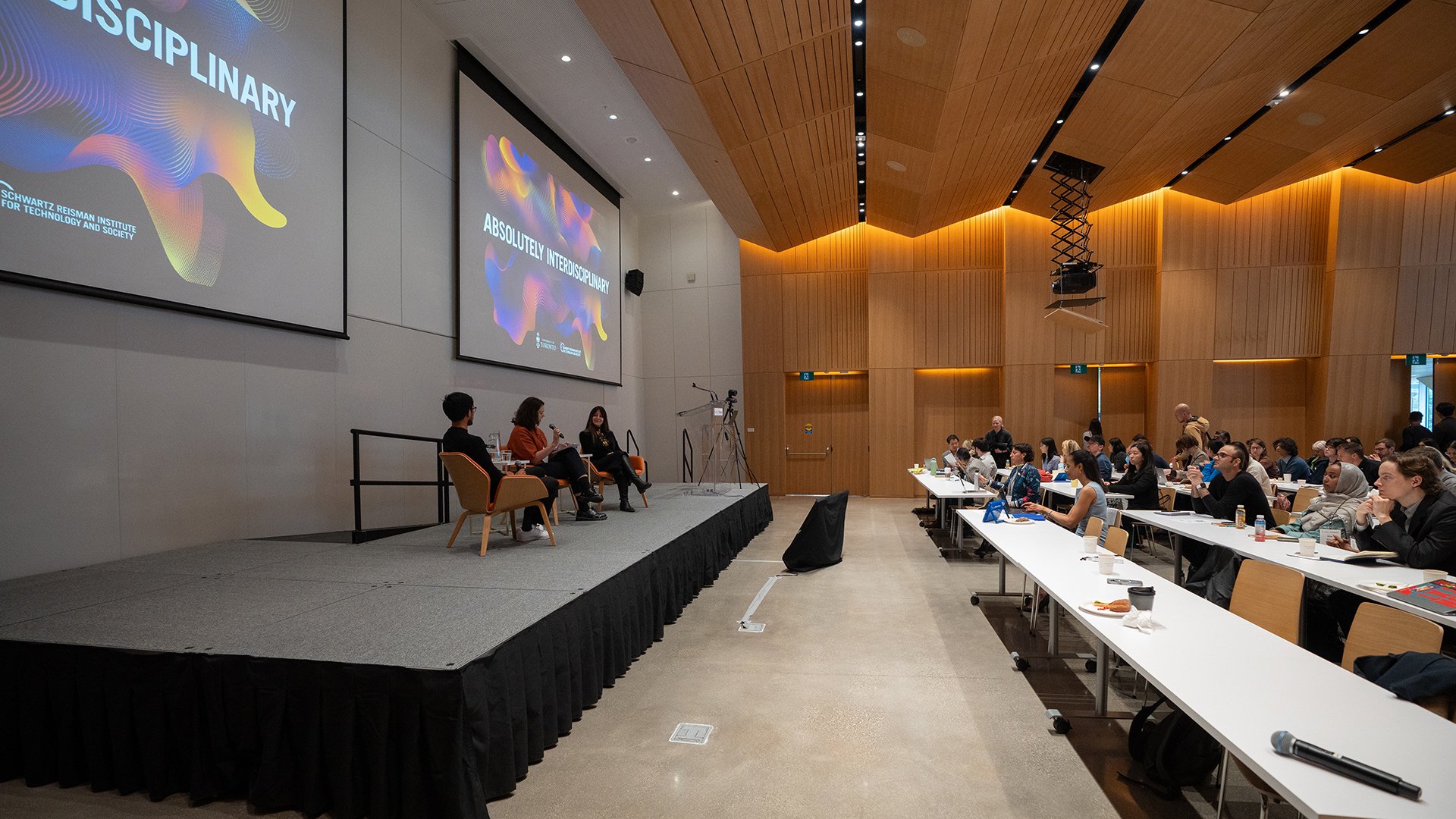Shedding some light on the SRI summer research assistant program
During the summer of 2024, the Schwartz Reisman Institute for Technology and Society welcomed a pair of Juris Doctor (JD) students to its summer research assistant (RA) program. Learn more about the students' research and SRI's partnership with U of T's Future of Law Lab.
For the third consecutive year, the Schwartz Reisman Institute for Technology and Society (SRI) opened its doors to a select group of Juris Doctor (JD) students through its summer research assistant (RA) program.
The program provides students with the unique opportunity to gain hands-on experience researching a specific topic within AI governance and regulation, and to focus their expertise on issues shaping the future of technology and its impacts on society. For the second of its three years, the program partnered with the University of Toronto’s Future of Law Lab (FOLL) to allow one of its participating students.
Situated at the intersection of law, innovation, technology, and entrepreneurship, FOLL explores the leading questions that are driving the trajectory of law and the legal profession through workshops, speakers’ series, courses, and co-curricular opportunities.
"University of Toronto law students possess a wealth of knowledge and skills, but they need outlets to put these talents to use in an experiential setting.” says FOLL Director Josh Morrison.
“SRI is the leading voice for AI and technology regulation in Canada, and our students benefit from working directly with SRI’s research leads and other experts.”
“It’s one thing to learn the theory, and another to convert it to the real world. SRI is the leading voice for AI and technology regulation in Canada, and our students benefit from working directly with SRI’s research leads and other experts.”
“This partnership with SRI provides an unparalleled opportunity for Future of Law Lab students to play a leading role in policy-making, taking their expertise and applying it to global challenges in order to make a meaningful impact in the international governance of technology."
Partnering with FOLL to enable summer research in ‘AI safety’
While volunteering at the Investor Protection legal clinic at U of T, Sarah Rosa began researching AI regulations within capital markets which served as an introduction to working with FOLL.
“When I saw the research opportunity within SRI, I was immediately interested because I really wanted to continue my research in AI—especially through the governance and regulatory lens,” says Rosa.
During Rosa’s time at SRI, she worked on projects ranging from literature reviews on AI safety to AI presentations for capital markets. She also worked on considering the future of Canada's AI Safety Institute by mapping the structure and goals of existing safety institutes in the UK, US, and EU, and assessing what Canada can learn.
“It’s a technology that’s in its infancy,” says Rosa about AI. “Development and deployment have always been the focus—and that makes sense, because for the most part research was really controlled or sponsored by companies who are interested in profits and bringing products to market. AI safety is more of a human policy concern. With governments getting involved [in AI safety], it’s sure to be getting more traction.”
In addition to research and analysis of AI policy, Rosa has spent her summer researching case law and theories of institutions and organizations by looking at institutional change in the healthcare industry in the age of AI.
“For the most part, research was really controlled or sponsored by companies who are interested in profits and bringing products to market. AI safety is more of a human policy concern. With governments getting involved [in AI safety], it’s sure to be getting more traction.”
Summer research assistant explores legal frameworks behind emerging technologies
Summer RA Ella Lim wasn’t exactly sure where she wanted her legal career to lead.
“I ended up applying to law school because employment and labour law was always interesting to me,” says Lim. “Once I was at the University of Ottawa, I found the tech hub within the city to be very interesting. I took a course on regulating AI, and SRI was something that was frequently mentioned within the course. So I reached out to SRI with the intention of learning more about AI regulation.”
Lim has spent her summer at SRI continuing her ongoing research into data governance and privacy, as well as the intersection of AI and human rights, the impacts of AI on democracy and elections, and the history of legal trusts. She recently wrote a summary for the SRI website of Bill C-70 and the measures it takes to bolster Canadian confidence in elections, as well as how it might apply to the use of AI in elections.
“AI is a focal point of national security, business, and different transactions. While there is a lot of talk, there isn’t a lot of guidance, in terms of ethics or how to leverage AI for good,” says Lim.
Additionally, Lim has done considerable research on the subject of griefbots—a controversial application of AI that has recently emerged as a means of addressing the difficult emotional experience of grieving over a loved one. Griefbots are essentially designed to mimic deceased individuals by using data from their digital footprint. Lim’s research explores the ethical and legal questions posed by this application of technology, with special consideration toward the implications for human dignity and the future of regulation.
Looking to the future
The continued success of JD students in the SRI summer RA program exemplifies the mutual benefits of interdisciplinary partnership across academic fields.
The Schwartz Reisman Institute not only advocates for an interdisciplinary approach to AI research and policy—it actively embodies it. By tapping into cutting-edge research and collaborating with partners who bring diverse perspectives, SRI helps to prepare students to address the complex challenges and opportunities that AI presents. Partnerships such as the one SRI has established with FOLL help provide students with a background in emerging legal sectors such as AI, and foster expertise in the next generation of leaders.








